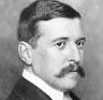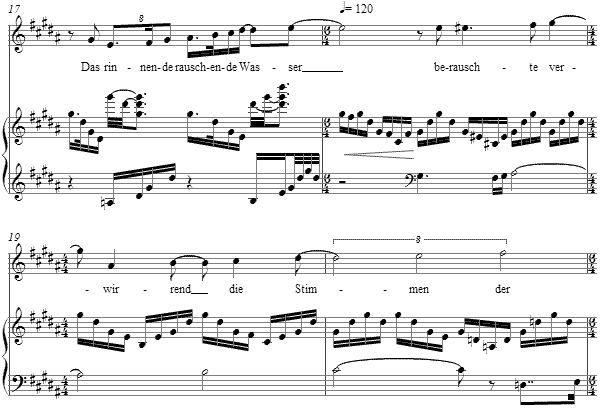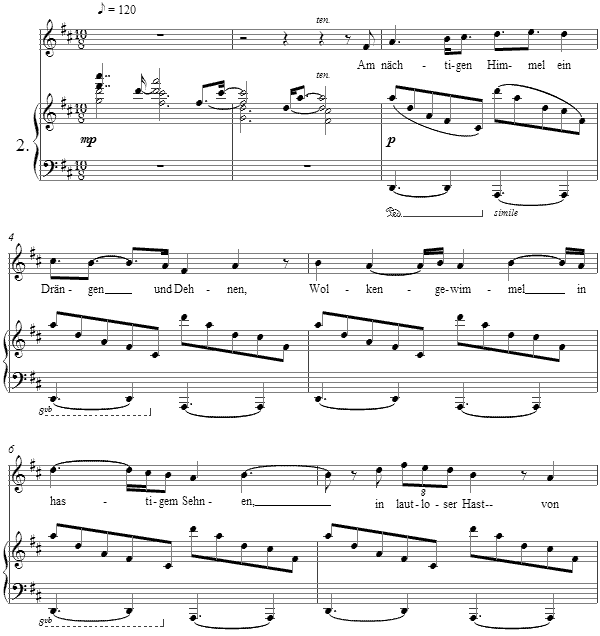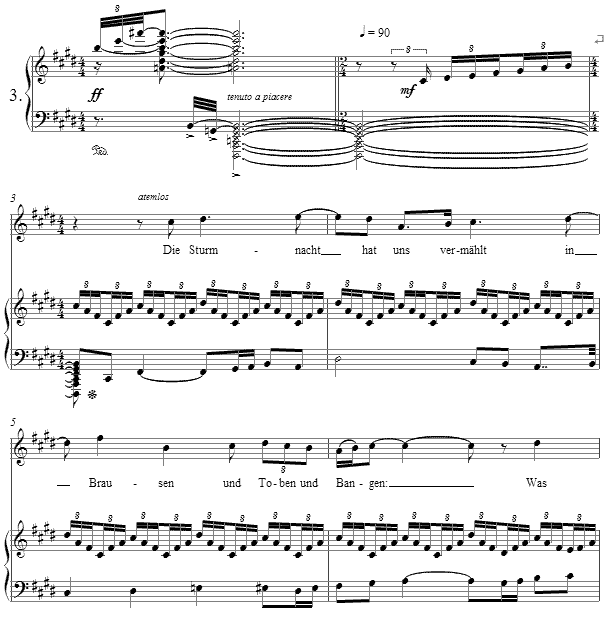Music and Texts of GARY BACHLUND Vocal Music | Piano | Organ | Chamber Music | Orchestral | Articles and Commentary | Poems and Stories | Miscellany | FAQs |
Drei Lieder von Hugo von Hofmannsthal - (2003)
Three songs for soprano and piano, or chamber orchestra
Carola Höhn gewidmet
Staatsoper Unter den Linden, Berlin
i. Regen in der Dämmerung [ 5 pages, circa 2' 55" ]
Der wandernde Wind auf den Wegen
War angefüllt mit süßem Laut,
Der dämmernde rieselnde Regen
War mit Verlangen feucht betaut.
Das rinnende rauschende Wasser
Berauschte verwirrend die Stimmen
Der Träume, die blasser und blasser
Im schwebenden Nebel verschwimmen.
Der Wind in den wehenden Weiden,
Am Wasser der wandernde Wind
Berauschte die sehnenden Leiden,
Die in der Dämmerung sind.
Der Weg im dämmernden Wehen,
Er führte zu keinem Ziel,
Doch war er gut zu gehen
Im Regen, der rieselnd fiel.ii. Wolken [ 3 pages, circa 2' 00" ]
Am nächtigen Himmel
Ein Drängen und Dehnen,
Wolkengewimmel
In hastigen Sehnen,
In lautloser Hast
- Von welchem Zug
Gebietend erfaßt? -
Gleitet ihr Flug,
Es schwankt gigantisch
Im Mondesglanz
Auf meiner Seele
Ihr Schattentanz,
Wogende Bilder,
Kaum noch begonnen,
Wachsen sie wilder,
Sind sie zerronnen,
Ein loses Schweifen . . .
Ein Halb-Verstehn . . .
Ein Flüchtig-Ergreifen . . .
Ein Weiterwehn . . .
Ein lautoses Gleiten,
Ledig der Schwere,
Durch aller Weiten
Blauende Leere.iii. Sturmnacht [ 5 pages, circa 2' 00" ]
Die Sturmnacht hat uns vermählt
In Brausen und Toben und Bangen:
Was unsre Seelen sich lange verhehlt,
Da ists uns aufgegangen.
Ich las so tief in deinem Blick
Beim Strahl von Wetterleuchten:
Ich las darin mein flammend Glück,
In seinem Glanz, dem feucthen.
Es warf der Wind dein duftges Haar
Mir spielend um Stirn und Wangen,
Es flüsterte lockend die Wellenschar
Von heißem tiefem Verlangen.
Die Lippen waren sich so nah,
Ich hielt dich fest umschlungen;
Mein Werben und dein stammelnd Ja,
Die hat der Wind verschlungen . . .Total duration [ 13 pages in piano-vocal, circa 7' 00" ]
Hugo von Hofmannsthal
Hugo von Hofmannsthal (1874-1929) was born February 1, 1874 in Vienna. As a child he was educated by private tutors, entering the Wiener Akademisches Gymnasium in 1884. A talented youth, he absorbed academic material very quickly, was an avid reader, and his intellectual abilities tended to set him apart from his peers more than his social status.
With the publication of his poem "Question" (1890) under the pseudonym Loris Melikow, Hofmannsthal made his entrance into the literary world. In little time he had made acquaintance and friendship with Hermann Bahr, Arthur Schnitzler, Stefan George, Gerhart Hauptmann, Maeterlinck, Rodin, and others. It is no overstatement to say that Hofmannsthal's intellectual Kreis was composed of some of the most influential artists of his time - all of them considerably older than he. From the beginning, his works were marked by a mature style, and few could believe that "Loris" was a 16-year old high school student.
Of those who were impressed by Hoffmansthal and who exerted considerable influence upon him, Stefan George was perhaps the most important. They met in 1891, and had a friendship that lasted over 15 years, but as time wore on, the differences in their visions became obvious, and eventually they took different paths, finally terminating contact shortly after the turn of the century.
After completing the Gymnasium in 1892, Hofmannsthal spent two years studying law, and in the fall of 1894 he started a year of active duty in the Sixth Dragoon Regiment. Law was his father's idea, and instead of returning to it, he came back to the university to study Romance Philology, and received his Doctorate in 1899. In 1905 he resigned his military commission, after having achieved the rank of reserve lieutenant during his time in the reserves.
1901 marks Hofmannsthal's marriage to Gertrud Schlesinger, seven years his junior. Their marriage was a happy one, albeit one marked by the fact that she did not share the same passions as he with regard to his work.
In 1903 Hofmannsthal wrote his drama Elektra, based upon the play by Sophocles. This led to contact with Richard Strauss. Elektra was set to music, and was the first of six works on which Hofmannsthal and Strauss collaborated. The two worked together for the rest of Hofmannsthal's life, yet their relationship, too, was marked by stress - primarily caused by differences of opinion and Strauss's demanding nature.
Hofmannsthal's life took a rather dramatic change during WWI. As Bangerter writes: "As an officer in the reserve, Hofmannsthal was recalled to the army in July, 1914. He served in the war ministry, and during the next two years traveled widely on secret political missions. He wrote patriotic articles and made speeches to groups of Austrian officers. When the Hapsburg monarchy fell, Hofmannsthal was not unprepared for it. Nonetheless, he viewed the death of the old regime as a personal disaster, the loss of an important part of his own life. It was a loss from which he did not fully recover." (Hugo von Hofmannsthal by Lowell A. Bangerter, published by Klett, 14.)
After the war, Hofmannsthal became increasingly involved with supporting and promoting the arts in Austria, and is noticeable in his involvement with the Salzburg Festival. He also took part in writing for several commercial ventures, such as Das deutsche Lesebuch and Wert und Ehre deutscher Sprache. These endeavors fit in with Hofmannsthal's desire to "make German cultural heritage more accesible" (Bangerter, 17), but at the same time, the financial difficulties facing Europe after WWI affected Hofmannsthal as well, and he suffered several period of financial hardship.
The end of Hofmannsthal's life was marked by great activity - in the 1920's he traveled a great deal and worked on numerous literary projects. He had three children, two of whom who survived him. On July 15, 1929 - two days after the suicide of his eldest son, Franz - Hugo von Hofmannsthal suffered a massive brain hemorrhage and died.
The cycle is set for soprano with a contrasting slower middle movement between two faster settings, in the manner of a sonata.
i. Rain in the Twilight
The changing wind on the byways
was filled with sweet sound,
the evening's gentle rain
was bedewed with longing.
The running, rushing water
exhilarated bewilderingly the voices
of dreams, fainter and fainterblurred by hovering clouds.
The wind in the fluttering willows,
On water the shifting wind
enchanted the yearning sorrows,
which are in the twilight.
The path in twilight's contractions
led to no destination,
but it was good to go
in the rain, which gently fell.
ii. Clouds
In the night sky
a pressing and stretching,
teeming clouds
in rushing longing,
in hurrying strings,
in silent haste
- in what pull
commandingly caught? -
it swayed gigantic
in the moon's shine
and on my soul was
its shadow dance,
heaving pictures,
hardly begun,
lengthening wildly,
are vanishing,
A loose tail...
A half-understood...
A fleeting grasping...
A further blown...
A soundless sliding,
Free of weight,
Through all expanse
bluely empty.
iii. A Stormy Night
The stormy night had wedded us
In roars and rages and frights:
What our souls had long concealed
Was in us arisen.
I read deep in your gaze
by the brilliance of that stormy light:
I read therein my blazing fortune,
In its brightness, so damp.
The wind tousled your soft hair
which played on my brow and cheeks.
The waving swarms whispered
of burningly deep longing.
Your lips were so near,
I held you fast in my embrace,
My wooing and your stammered Yes
had entwined with the wind.
The opening setting opens with the rainy day, as one begins to experience "running, rushing water." As the text makes clear this is a gentle evening's weather, unlike the last movement, the opening begins with small gestures high in the piano's range.
As the "running, rushing water" mixes with images from one's dreams, the bass line sings out a contrasting voice to the soprano, as the treble arpeggios rush ahead and the path "unwinds" to its ending.
The centerpiece of this short cycle is a limpid 10/8, in which the tonality changes minimally under a litany of images of clouds as the imagination dances across their shapes, seeing what perhaps is not there after all on a calm, cloud filled day.
The images of a tempestuous night mixes with images of a tempestuous relationship between two lovers, as the accompaniment rushes forward in triplet arpeggios. The gestures are somewhat akin to the calmer opening song setting, the lower voice in the accompaniment being a counter voice to the singer's.
Carola Höhn
Soprano Carola Höhn, to whom this small cycle is dedicated, has sung widely in Germany as well as internationally, and has been with the Staatsoper Berlin for many years. My wife and I have been guests at her beautiful home in the suburbs of Berlin near Spandau.
The score of Drei Leider von Hugo von Hofmannsthal in the high key is available as a free PDF download, though any major commercial performance or recording of the work is prohibited without prior arrangement with the composer. Click on the graphic below for this piano-vocal score.
Drei Leider von Hugo von Hofmannsthal
Klavieraufzug
_________________________________
Drei Leider von Hugo von Hofmannsthal





